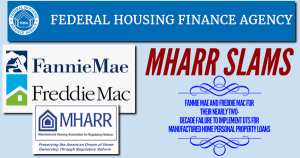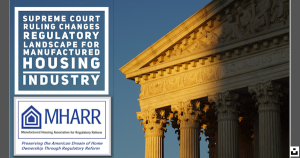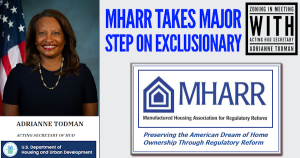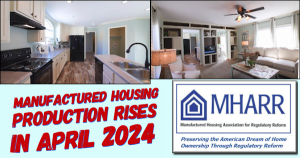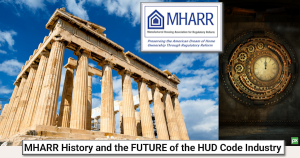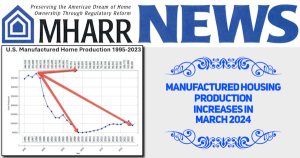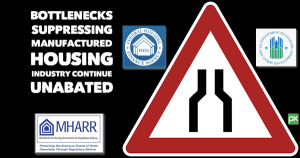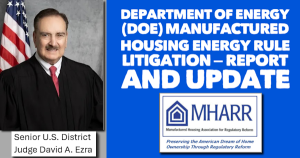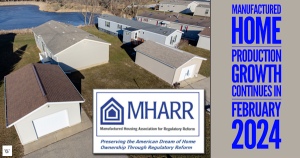MHARR Comments To FHFA Seek Full Compliance With “DUTY TO SERVE” Mandate
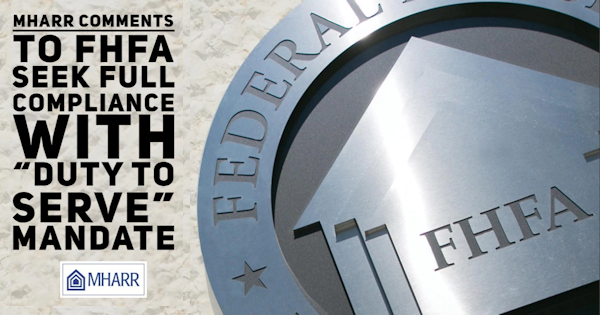
Washington, D.C., August 27, 2020 – The Manufactured Housing Association for Regulatory Reform (MHARR) has filed comments ( attached) on a proposed Federal Housing Finance Agency (FHFA) rule concerning regulatory capital requirements for the two Government Sponsored Enterprises (GSEs), Fannie Mae and Freddie Mac. The proposed rule, published in the Federal Register on June 30, 2020 (as reported by MHARR), would establish new capital requirements for the GSEs, focused on their anticipated exit from the FHFA conservatorship that has been in place since September 2008.
As MHARR noted when the proposed rule was published, its primary concern was – and continues to be – focused on the GSEs’ near-total failure, after some twelve years, to fully implement the statutory “Duty to Serve Underserved Markets” (DTS) mandate with respect to mainstream federally-regulated manufactured housing and, more particularly, on: (1) any potential negative impacts of a final FHFA Regulatory Capital rule on future DTS compliance by the Enterprises or, worse yet; (2) a de facto nullification of DTS by a final Regulatory Capital Framework rule.
MHARR is particularly wary of the proposed Regulatory Capital Framework rule and its potential adverse impacts on full, market-significant DTS compliance by the GSEs, based on a number of specific factors. These include the near-total failure of Fannie Mae and Freddie Mac to implement DTS with respect to mainstream, affordable HUD Code manufactured housing over the course of more than a decade, the GSEs’ clear desire to divert DTS support from those mainstream affordable manufactured homes to much more costly “hybrid” homes produced by the industry’s largest corporate conglomerates, and the demonstrated willingness of the GSEs’ erstwhile federal regulators at FHFA to accommodate, overlook, excuse and provide “cover” for that failure with both Congress and the Administration.
Rather than overlooking or serving as cheerleaders for this abject failure, as the industry’s supposed post-production representation has done, MHARR, representing the industry’s smaller businesses, is the only collective industry organization in Washington, D.C. actively seeking to hold both Fannie and Freddie accountable for full compliance with the mandatory DTS law, and to have both those entities and FHFA go back to the proverbial “drawing board” in order to develop approaches and programs for mainstream manufactured housing under DTS that actually work for lower and moderate-income consumers and the industry.
At a time when the overall housing market is experiencing significant growth, the mainstream manufactured housing market continues to be significantly hobbled by baseless zoning discrimination and a lack of fully-competitive consumer financing – especially for the industry’s most affordable homes financed as personal property. This only underscores and enhances DTS’ importance as a crucial remedial measure. As a result, the gamesmanship that has undermined DTS must end and, after 12 wasted years, DTS must be fully and effectively implemented.
As part of its efforts to hold Fannie and Freddie accountable for their failure to comply with DTS, MHARR has recently been engaged in a process with senior FHFA officials designed to provide accurate and factual information showing Fannie Mae and Freddie Macs’ broad defiance of DTS that, over the course of more than a decade, has left well over 90 percent of the mainstream manufactured housing market completely unserved. Meanwhile, both entities, with the support of the industry’s largest conglomerates, persist in trying to twist, distort and alter the DTS mandate by seeking to divert its focus from mainstream, affordable, federally-regulated manufactured housing, to much more costly, non-affordable hybrid type homes.
MHARR thus continues to seek the full, market-significant implementation of DTS as one of its key objectives going forward, and will provide additional information to industry members as developments warrant.
The Manufactured Housing Association for Regulatory Reform is a Washington, D.C.-based national trade association representing the views and interests of independent producers of federally-regulated manufactured housing.


Washington, D.C., August 27, 2020 – The Manufactured Housing Association for Regulatory Reform (MHARR) has filed comments ( attached) on a proposed Federal Housing Finance Agency (FHFA) rule concerning regulatory capital requirements for the two Government Sponsored Enterprises (GSEs), Fannie Mae and Freddie Mac. The proposed rule, published in the Federal Register on June 30, 2020 (as reported by MHARR), would establish new capital requirements for the GSEs, focused on their anticipated exit from the FHFA conservatorship that has been in place since September 2008.
As MHARR noted when the proposed rule was published, its primary concern was – and continues to be – focused on the GSEs’ near-total failure, after some twelve years, to fully implement the statutory “Duty to Serve Underserved Markets” (DTS) mandate with respect to mainstream federally-regulated manufactured housing and, more particularly, on: (1) any potential negative impacts of a final FHFA Regulatory Capital rule on future DTS compliance by the Enterprises or, worse yet; (2) a de facto nullification of DTS by a final Regulatory Capital Framework rule.
MHARR is particularly wary of the proposed Regulatory Capital Framework rule and its potential adverse impacts on full, market-significant DTS compliance by the GSEs, based on a number of specific factors. These include the near-total failure of Fannie Mae and Freddie Mac to implement DTS with respect to mainstream, affordable HUD Code manufactured housing over the course of more than a decade, the GSEs’ clear desire to divert DTS support from those mainstream affordable manufactured homes to much more costly “hybrid” homes produced by the industry’s largest corporate conglomerates, and the demonstrated willingness of the GSEs’ erstwhile federal regulators at FHFA to accommodate, overlook, excuse and provide “cover” for that failure with both Congress and the Administration.
Rather than overlooking or serving as cheerleaders for this abject failure, as the industry’s supposed post-production representation has done, MHARR, representing the industry’s smaller businesses, is the only collective industry organization in Washington, D.C. actively seeking to hold both Fannie and Freddie accountable for full compliance with the mandatory DTS law, and to have both those entities and FHFA go back to the proverbial “drawing board” in order to develop approaches and programs for mainstream manufactured housing under DTS that actually work for lower and moderate-income consumers and the industry.
At a time when the overall housing market is experiencing significant growth, the mainstream manufactured housing market continues to be significantly hobbled by baseless zoning discrimination and a lack of fully-competitive consumer financing – especially for the industry’s most affordable homes financed as personal property. This only underscores and enhances DTS’ importance as a crucial remedial measure. As a result, the gamesmanship that has undermined DTS must end and, after 12 wasted years, DTS must be fully and effectively implemented.
As part of its efforts to hold Fannie and Freddie accountable for their failure to comply with DTS, MHARR has recently been engaged in a process with senior FHFA officials designed to provide accurate and factual information showing Fannie Mae and Freddie Macs’ broad defiance of DTS that, over the course of more than a decade, has left well over 90 percent of the mainstream manufactured housing market completely unserved. Meanwhile, both entities, with the support of the industry’s largest conglomerates, persist in trying to twist, distort and alter the DTS mandate by seeking to divert its focus from mainstream, affordable, federally-regulated manufactured housing, to much more costly, non-affordable hybrid type homes.
MHARR thus continues to seek the full, market-significant implementation of DTS as one of its key objectives going forward, and will provide additional information to industry members as developments warrant.
The Manufactured Housing Association for Regulatory Reform is a Washington, D.C.-based national trade association representing the views and interests of independent producers of federally-regulated manufactured housing.



